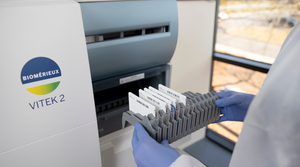Sensor Chip Provides Thermal Resistance Measuring
July 2, 2004
OriginallyPublished MPMN July 2004
HOTLINE
Sensor Chip Provides Thermal Resistance Measuring
Self-heating component applications include microelectronics and biomedical engineering
Melody Lee
|
Self-heating sensor chips can potentially be used for invasive techniques. |
A line of self-heating sensor chips is made with platinum on alumina and oxidized silicon. The sensors, offered by State of the Art Inc. (State College, PA), are used to determine the thermal resistance of integrated circuit chips. In the biomedical field, the products maintain temperature in minicell arrays during bacterial growth. Potential medical applications include heating and temperature control.
Using the products as a microheater provides a precise heating device, says Amit Das, director of product development. "The sensors are made with inert materials so they could potentially be used for invasive techniques. [Our company] makes chip resistors for pacemakers and hearing aids, but this is different. This resistor gives out heat, and the sensor monitors and maintains the temperature."
Available with two design options, the TM365 features two thermal sensors in close proximity to the heater for stringent temperature control. The TM364 single-sensor model is suitable for moderate temperature control. Both offer operating temperatures up to 250°C.
"We're looking for a customer who needs to build an application [for our product]," says Das. "There's a lot of new instrumentation and design that we're not familiar with, but we can provide the technology to make the devices. It can be a feeler for us to explore newmarkets."
State of the Art Inc.
2470 Fox Hill Rd.
State College, PA 16803-1797
tel: 800/458-3401
fax: 814-355-2714
e-mail: [email protected]
url: www.resistor.com
Copyright ©2004 Medical Product Manufacturing News
You May Also Like


